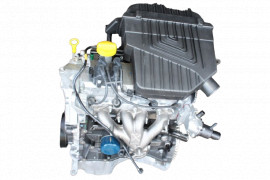Import Engines: Tips for Setup and Maintenance
A Comprehensive Comparison of Different Types of Import Engines and Their Applications in Various Automobiles
From the effectiveness of turbocharged engines to the environmental kindness of electrical powertrains, the spectrum of import engines readily available in today's market provides to a broad selection of driving requirements and preferences. Whether it's the torque of a diesel engine or the unconventional layout of a rotary engine, recognizing the subtleties of each type and just how they align with details automobile needs can substantially impact efficiency, fuel economic situation, and overall driving experience.
Turbocharged Engines
Turbocharged engines, recognized for their ability to boost power outcome successfully, have come to be progressively common in modern lorry styles. By making use of exhaust gases to drive a wind turbine that presses incoming air into the engine, turbochargers properly boost the quantity of air and gas mix that can be ignited, resulting in enhanced efficiency without significantly boosting engine size. This technology enables suppliers to downsize engines, causing better fuel performance while keeping power levels similar to bigger, naturally aspirated engines.

Crossbreed Engines
With the innovations in engine modern technology facilitating enhanced efficiency and performance, the vehicle market has seen a rise in the integration of hybrid engines as a sustainable option for power distribution. Hybrid engines integrate the advantages of both inner burning engines and electric motors to supply improved gas effectiveness and reduced discharges. By perfectly switching over between both power resources or using them all at once, hybrid engines offer flexibility in different driving problems.

Moreover, hybrid technology is not restricted to a particular car type, with applications varying from compact cars to larger SUVs and also high-performance cars. As environmental concerns and fuel effectiveness policies come to be increasingly noticeable, hybrid engines represent a considerable action towards lasting transport services.
Electric Engines
Electric engines have actually revolutionized the vehicle industry with their effective and environmentally-friendly power delivery systems. import engines. These engines run by transforming electric energy into mechanical power, using a smooth and silent driving experience. Unlike standard burning engines, electrical engines create absolutely no tailpipe emissions, decreasing the total carbon impact of cars and assisting combat air pollution
One of the vital advantages of electric engines is their high power performance, generally converting over 80% of the electrical power right into propulsion. This efficiency converts right into cost savings for consumers with lowered gas expenditures. Additionally, electric engines require much less upkeep compared to internal combustion engines, as they have fewer relocating components that can wear out in time.
Electric engines are typically made use of in electrical cars (EVs) and hybrid electric cars (HEVs) EVs depend exclusively on electrical engines for propulsion, drawing power from rechargeable batteries. On the other hand, HEVs integrate electric engines with conventional interior combustion engines to optimize navigate here fuel performance and lower exhausts. The convenience and sustainability of electric engines make them an encouraging remedy for the future of transport.
Diesel Engines
Diesel motor are renowned for their exceptional fuel effectiveness and robust performance in a range of vehicle applications. These engines run by pressing air in the cyndrical tubes, which leads to heats that fire up the injected gasoline without the requirement for ignition system. This burning approach provides diesel engines with greater torque outcomes compared to gasoline engines, making them optimal for sturdy automobiles like vehicles, buses, and building devices.
Among the vital benefits of diesel motor is their premium gas effectiveness, as they can take a trip further on a gallon of gas contrasted to fuel engines. This effectiveness is especially helpful for long-haul transport and industrial fleets, where lowering gas prices is a substantial variable. Furthermore, diesel engines are known for their durability and long life, calling for much less maintenance over their lifespan contrasted to gas engines.
In recent years, developments in diesel engine modern technology have actually also focused on reducing exhausts to satisfy strict environmental laws. Modern diesel motor are geared up with innovative discharges control systems, such as diesel particle filters and careful catalytic reduction, which aid reduce pollutants launched into the ambience - import engines. These developments have actually made diesel engines cleaner and more ecologically friendly while preserving their effectiveness and efficiency qualities
Rotating Engines
Prominent for their special layout and performance features, rotary engines use a distinct alternative to conventional burning engine modern technologies like diesel engines. These engines, also known as Wankel engines, operate on a various concept contrasted to conventional piston engines.

Final Thought
In conclusion, the contrast of different sorts of import engines highlights the diversity of options available for numerous lorries. Turbocharged engines use enhanced power and efficiency, crossbreed engines integrate electric and traditional power resources for enhanced fuel economic climate, electrical engines offer a clean and sustainable choice, diesel engines are recognized for their toughness and torque, and rotary engines supply a special layout with additional reading capacity for high efficiency. Each engine type has its very own staminas and applications in the automotive market.
Additionally, hybrid engines add to a quieter driving experience and often give a smoother acceleration contrasted to traditional interior combustion engines.
Distinguished for their unique style and efficiency qualities, rotating engines offer an unique alternative to conventional combustion engine technologies like diesel engines. These engines, additionally known as Wankel engines, run on a various principle compared to standard piston engines. Despite these restrictions, rotating engines continue to attract lovers and makers looking for a various engine modern technology with distinct benefits.
Turbocharged engines supply increased power and effectiveness, crossbreed engines incorporate traditional and electric power resources for improved fuel economic climate, electrical engines give a clean and read this article sustainable alternative, diesel engines are understood for their toughness and torque, and rotating engines offer a distinct style with capacity for high efficiency.